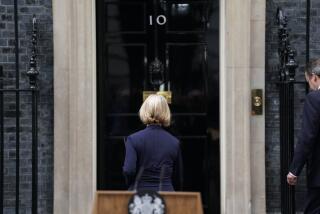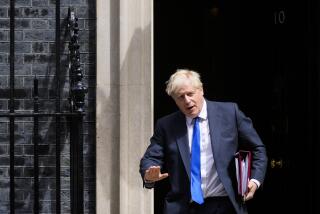Blair’s Political Future Suddenly Looks Shakier
- Share via
LONDON — The scandal over prisoner abuse in Iraq has rocked the government of Prime Minister Tony Blair at a time when he is already battered by months of criticism over the war, raising questions about his ability to maintain support within his party and lead it into elections next year.
After a meeting with China’s premier Monday, Blair endured a barrage of questions from journalists who asked how Britain could criticize the Chinese record on human rights when British troops had allegedly committed rights violations in Iraq.
In an indication of how difficult the scandal may make things for future military operations, the sour public mood after news of the scandal broke reportedly caused the government to back away from a decision to send more troops to Iraq.
Some political analysts believe it may even hasten the end of Blair’s leadership of the country, perhaps triggering a coup within his party.
“The prime minister is synonymous with Iraq, and Iraq will only deliver bad news,” said David Puttnam, a Labor Party member of the House of Lords. “If I were him, I would go before the summer recess.”
Puttnam, a film producer, called for Blair to step aside as party leader and prime minister in favor of Chancellor of the Exchequer Gordon Brown.
“The moral high ground is not looking so high anymore,” said Michael Cox, a political scientist at the London School of Economics.
Just as the war in Iraq is “Bush’s war” in the United States, it is “Blair’s war” for those in Britain who have accused the government of rushing into the conflict based on dubious claims of threats and “sexed-up” intelligence.
The failure to discover hidden weapons of mass destruction in Iraq and the long-running and apparently growing resistance among Iraqis to U.S. and British troops have only increased the misgivings.
Now the publication of photographs depicting brutal and humiliating treatment of prisoners by U.S.-led coalition troops, accompanied by damning charges of human rights abuses from the International Committee of the Red Cross and Amnesty International, appears to be sapping the will of many Britons to continue their nation’s involvement in Iraq.
A survey by the Independent newspaper released Monday indicates that 55% of respondents would like to see all British troops leave Iraq by June 30, the coalition’s target date for handing over sovereignty to an interim Iraqi government that has not yet been named. A third of the respondents who favor withdrawal would like it to happen immediately.
Against this backdrop, Blair and Defense Secretary Geoff Hoon struggled Monday to recoup the reputation of the government and of British participation in the coalition.
Blair, at his news conference with Chinese Premier Wen Jiabao, argued that a Red Cross report that was given to British representatives in February criticized British troops in only two passages, and that the authorities had taken corrective steps long before receiving the document.
“If allegations are made against British soldiers, we investigate them. We take action,” he said heatedly.
Hoon, speaking in the House of Commons, reiterated that the government had responded quickly to cases of reported abuse.
The Red Cross criticized the conduct of British troops in connection with the death of a 26-year-old hotel worker last year, he said.
But “by the time the ICRC referred to the case ... a thorough investigation was well underway,” Hoon said.
The British government had previously abandoned the practice of covering prisoners’ heads with hoods, which was raised as another concern by the Red Cross, he said.
Since the scandal broke, Blair has repeatedly apologized for any harm done to prisoners in British custody and to “anyone who has been mistreated by our soldiers.” But there are few signs that the apologies have mitigated public unease among Britons about the war.
Even if the case against British troops proves to be less appalling than the charges being leveled against some U.S. soldiers, political scientist Cox said, the scandal could have serious consequences for Blair’s position and perhaps even for Anglo-American relations.
“If Bush is badly hurt by these revelations, then it is bound to hurt Blair,” Cox said.
He speculated that the war could loom as an issue in local, regional and European parliamentary elections taking place in Britain next month, even though those votes are normally sparsely attended. If they show that voters are turning away from Labor, that could be the signal for dissatisfied party members to seek a change in leadership rather than face a general election next year with Blair at the helm.
“He made the Labor Party electable, twice. If now Blair becomes an electoral liability, then people will wonder. It can happen rather quickly,” Cox said. “It is not now inconceivable -- Blair is beginning to have that look of a politician with his best days behind him.”
More to Read
Sign up for Essential California
The most important California stories and recommendations in your inbox every morning.
You may occasionally receive promotional content from the Los Angeles Times.













